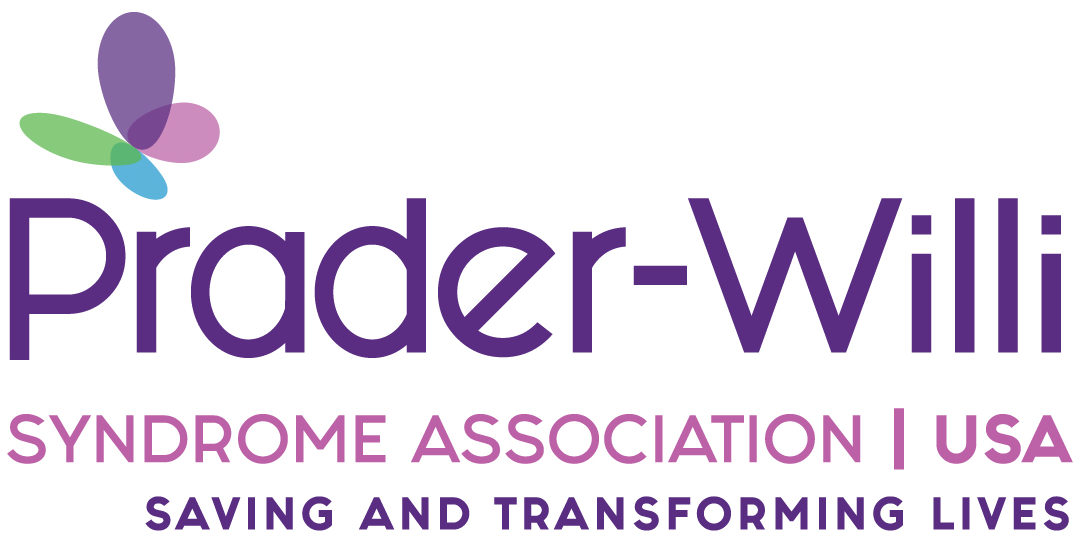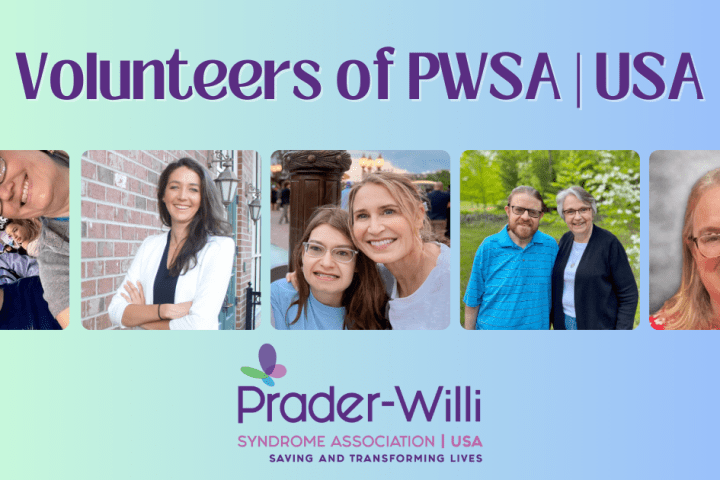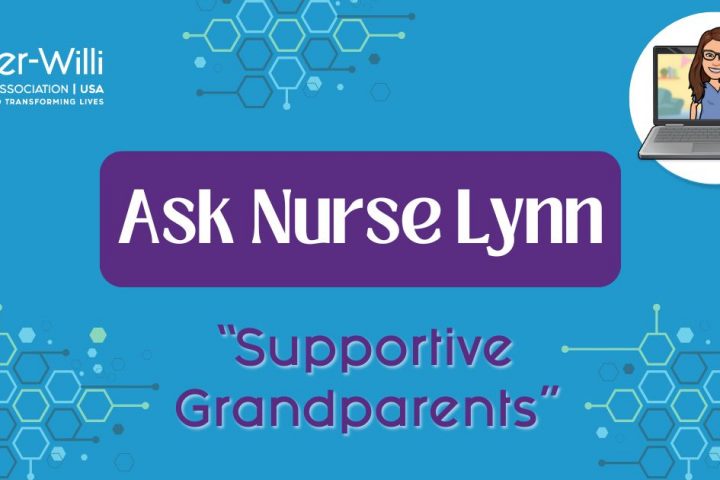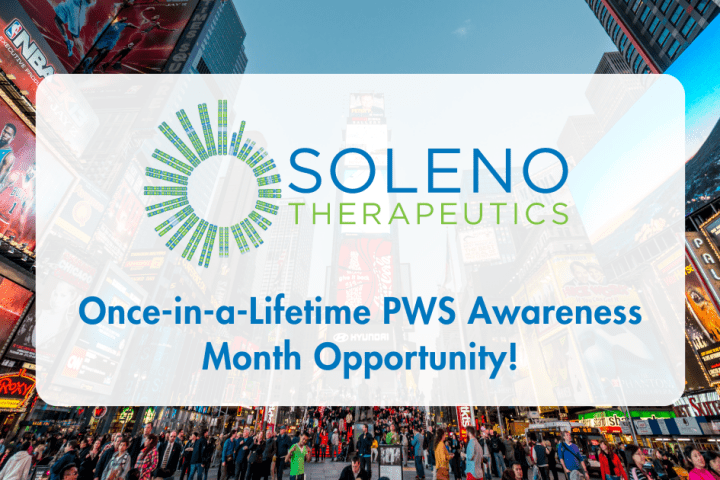Janalee Heinemann, PWSA (USA) Coordinator of Research and International Affairs
Noninvasive prenatal screening (NIPS) – also called noninvasive prenatal testing (NIPT) or cell–free DNA testing – is now available for Prader-Willi syndrome (PWS). Testing can be done any time after 9-10 weeks gestation because DNA from the fetus circulates in maternal blood. The testing is non-invasive, involving a maternal blood draw, so the pregnancy is not put at risk for miscarriage or other adverse outcomes associated with invasive testing procedures. The results are typically available within a week to 10 days. This testing has been available for trisomy 21 (Down syndrome) for 4 years, but recently they have added the option of testing for Prader-Willi syndrome and several other microdeletion syndromes plus sex chromosome abnormalities.Note: This is a screening test, not a diagnostic test. Currently it is mainly available to high risk women, but is most likely going to become available to all pregnant women.
But New Technologies Bring New Ethical Dilemmas…
I was on a panel in July at an international conference in D.C. on this issue representing Prader-Willi syndrome from a patient advocacy perspective. The title of the conference was “Stakeholder Perspectives on Noninvasive Prenatal Genetic Testing: What we have learnt and where we are going.” We discussed the legal, ethical and social implications of NIPS plus clinical implementation issues and disability rights. The following notes are from some of the presentations and discussions that day.
Advantages – NIPS streamlines information. You can get the blood test while at a regular appointment and it can be more private. There is no risk of miscarriage. If it is negative for a high risk mother, it may reduce the stress on her and her spouse/partner. NIPS is more accurate than other first and second trimester serum screening tests, and as a result fewer women need to have diagnostic tests (like amniocentesis) for confirmation of serum screening results. If the parents and the medical staff know what to expect and are prepared to address the potential medical issues at the time of birth, for some, this diagnosis can make a life and death difference.
Disadvantages – Although the testing companies claim that NIPS is 90%-99% accurate, there is a chance of false positives or false negatives, especially with rare conditions such as PWS. Often, all of the information on all of the tests needs to be relayed in a 20 minute visit. This can cause anxiety and stress and raise ethical concerns about informed decision-making. It is a screening test, not a diagnostic test – yet 6% of women who receive a positive NIPS result terminate without confirmation. Noninvasive testing for PWS can detect whether a fetus has a good chance of having PWS or Angelman syndrome but cannot separate out which one – and there is a big difference in the phenotype between the two. At this time it will only pick up on deletion, not UPD.
What does informed consent look like? – Ideally, a genetic counselor would meet with the person/couple before screening, and afterwards if there is a positive result. The meeting before the screening is to make sure that the person /couple understands the benefits and risks associated with screening and that they know the emotional and ethical issues that will arise if the test comes back positive. In reality though, there is limited access to genetic counselors and it will become even more of a problem as use of NIPS increases potentially among average risk women. There are not enough genetic counselor training programs or enough people going to medical school receiving training on medical genetics. In fact, the number of geneticists is predicted to be decreasing just as there is a greater need due to the explosion in genetics. The role of informed consent and counseling will increasingly become the responsibility of the GP or OB/GYN – who typically has little experience in genetics. In a survey, a lot of GPs thought they should refer to a geneticist, but in reality fewer actually make that referral. Also, the counseling is needed in a very timely manner, not an appointment months away after the woman and her partner already have had to make a decision. Better education of GPs and OB/GYNs and more objective educational materials are needed. This is far from ideal but more realistic than trying to refer all women considering NIPS to geneticists and genetic counselors. There should be standards of what women are told about NIPS, including that they have the right to decline screening. In one state, NIPS may be ordered and the testing done without actually going to an appointment with a physician – just going to a blood lab. Will this be the wave of the future?
Reimbursement issues – NIPS coverage, like other coverage, depends on whether insurers consider it “medically necessary” and it has “analytic and clinical validity” vs “experimental” or “investigational”. Insurance policies differ and lead to inconsistent access. And in some states, decisions about NIPS usually depend less on assessments of the validity of NIPS, and more on the local political and economic situation – as such. Medicaid coverage varies state-to-state. In the US, women who are White and/or have a higher socioeconomic status are more likely to have NIPS. In some European countries it is likely to be covered by public health care.
When it becomes available to the mass population:
- Ethical issues may increase because of “routinization” of testing
- Informed consent may be eroded raising ethical concerns about patient autonomy
- Due to increasing peer pressure to test there is concern about discrimination regarding the worth of a child with disabilities
- Women may not be asked for a detailed family history or be advised of potential additional genetic risks
- There will need to be education of non-specialist providers , which is not industry driven alone. What tools and methods would be best to educate the physicians? Should there be online courses for physicians? How do we evaluate the effectiveness of education? Should there be CME’s?
- There will need to be patient education that is not industry driven
- There is aggressive marketing by companies. Is it being implemented too fast?
Kaiser Permanente Health Care in Southern CA
– They serve 10% of California. They have 8 clinical geneticists and 40 genetic counselors. Every one of their female patients considering NIPS sees a genetic counselor, but this will not be sustainable as testing expands. Amniocentesis testing has dropped significantly due to improved ultrasounds and NIPS. Approximately 80% of women who are offered NIPS decide to have it. Kaiser Permanente Health Care in Southern California does 140-150 tests a week. Of 6,931 women tested so far, 227 had an abnormal (positive) NIPS result. Currently if you factor in the cost for all that get tested, the cost per abnormal diagnosis for NIPS = $56,000, but if offered to all, it will be $250,000 per abnormal diagnosis. Testing for Down syndrome has been available for a long time. At Kaiser, in the past, 65% terminated the pregnancy for Down syndrome– now with NIPS, it has increased to 75%, not as much of an increase as expected.
Report on Buenos Aires, Argentina – One-half of all patients are in the public health care system and one-half are in the private system. Abortion is not legal. The only exception is if the mother’s life is at risk. Although abortion is not legal, it is the leading cause of maternal mortality with 85% of the deaths occurring in public hospitals. Those that can afford it go elsewhere for the abortion, thus illegal abortion is unsafe for the poor – but not unsafe for the rich. Only one in 500 have had NIPS so far.
Report on China – It is illegal to remove Chinese citizens DNA from China, so only Chinese companies can offer genetic testing within China. It is also illegal to test for fetal sex in China due to a history of sex-selective abortions and giving girls up for adoption. On the other hand, if the screening shows an abnormality, it is culturally expected that the pregnancy will be terminated. Berry Genomics in China reports that they have done more than a million NIPS. It costs an average of one month’s income for the testing. Testing is paid for out of pocket and there are NO trained genetic counselors to perform pre-test counseling. There are attempts by the government to improve genetics education of physicians.
Patient advocate panel – We were there to bring the face to the statistics, and the human and ethical issues to the clinicians and technicians. To some of you, I am sure that terminating a pregnancy would have never been an option under any circumstances. But, to others, you may wonder what your decision would have been if NIPS had been an option to you at the time. What would it be if one of your other children was at risk once they are grown and have children of their own? No matter what that decision would be, I think we all agree that our children are precious and deserve to be on this earth as much as we do. I was told one country had a goal to be “Down syndrome free” by a certain year. Would we really be a better world without children who have Down syndrome – or PWS?





 Jennifer Bolander has been serving as a Special Education Specialist for PWSA (USA) since October of 2015. She is a graduate of John Carroll University and lives in Ohio with her husband Brad and daughters Kate (17), and Sophia (13) who was born with PWS.
Jennifer Bolander has been serving as a Special Education Specialist for PWSA (USA) since October of 2015. She is a graduate of John Carroll University and lives in Ohio with her husband Brad and daughters Kate (17), and Sophia (13) who was born with PWS. Perry A. Zirkel has written more than 1,500 publications on various aspects of school law, with an emphasis on legal issues in special education. He writes a regular column for NAESP’s Principal magazine and NASP’s Communiqué newsletter, and he did so previously for Phi Delta Kappan and Teaching Exceptional Children.
Perry A. Zirkel has written more than 1,500 publications on various aspects of school law, with an emphasis on legal issues in special education. He writes a regular column for NAESP’s Principal magazine and NASP’s Communiqué newsletter, and he did so previously for Phi Delta Kappan and Teaching Exceptional Children. Evan has worked with the Prader-Willi Syndrome Association (USA) since 2007 primarily as a Crisis Intervention and Family Support Counselor. Evans works with parents and schools to foster strong collaborative relationships and appropriate educational environments for students with PWS.
Evan has worked with the Prader-Willi Syndrome Association (USA) since 2007 primarily as a Crisis Intervention and Family Support Counselor. Evans works with parents and schools to foster strong collaborative relationships and appropriate educational environments for students with PWS. Dr. Amy McTighe is the PWS Program Manager and Inpatient Teacher at the Center for Prader-Willi Syndrome at the Children’s Institute of Pittsburgh. She graduated from Duquesne University receiving her Bachelor’s and Master’s degree in Education with a focus on elementary education, special education, and language arts.
Dr. Amy McTighe is the PWS Program Manager and Inpatient Teacher at the Center for Prader-Willi Syndrome at the Children’s Institute of Pittsburgh. She graduated from Duquesne University receiving her Bachelor’s and Master’s degree in Education with a focus on elementary education, special education, and language arts. Staci Zimmerman works for Prader-Willi Syndrome Association of Colorado as an Individualized Education Program (IEP) consultant. Staci collaborates with the PWS multi-disciplinary clinic at the Children’s Hospital in Denver supporting families and school districts around the United States with their child’s Individual Educational Plan.
Staci Zimmerman works for Prader-Willi Syndrome Association of Colorado as an Individualized Education Program (IEP) consultant. Staci collaborates with the PWS multi-disciplinary clinic at the Children’s Hospital in Denver supporting families and school districts around the United States with their child’s Individual Educational Plan. Founded in 2001, SDLC is a non-profit legal services organization dedicated to protecting and advancing the legal rights of people with disabilities throughout the South. It partners with the Southern Poverty Law Center, Protection and Advocacy (P&A) programs, Legal Services Corporations (LSC) and disability organizations on major, systemic disability rights issues involving the Individuals with Disabilities Education Act (IDEA), Americans with Disabilities Act (ADA), and the federal Medicaid Act. Recently in November 2014, Jim retired.
Founded in 2001, SDLC is a non-profit legal services organization dedicated to protecting and advancing the legal rights of people with disabilities throughout the South. It partners with the Southern Poverty Law Center, Protection and Advocacy (P&A) programs, Legal Services Corporations (LSC) and disability organizations on major, systemic disability rights issues involving the Individuals with Disabilities Education Act (IDEA), Americans with Disabilities Act (ADA), and the federal Medicaid Act. Recently in November 2014, Jim retired.